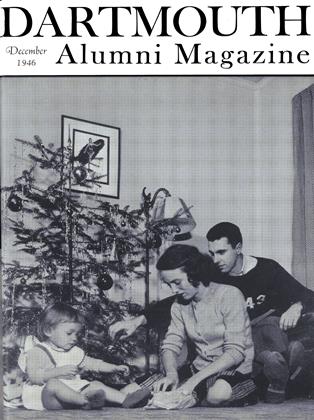Football Shortage
To THE EDITOR:
In spite of a mediocre football record so far as victories are concerned, I am writing this letter, which I hope you will publish, in defense of Tuss McLaughry and his coaching staff.
College football, so far as amateurism is concerned, is in a most confused state, as witness the appearance of such an article in the Saturday Evening Post (November 9, 1946) as "Football's Black Market" by Francis Wallace. With professional football as a dangerous and successful competitor, with the alumni demand for a winning team, and with the necessity of making a lot of money to support other sports, college football is far beyond the stage of pleasant inter-collegiate competition. A coach has to produce.... or else. No coach can produce without football players, both heavy and fast, and as I have seen Dartmouth play this year I can not with any honesty rave about our material. In spite of fighting qualities (though our team has never reached the fighting spirit of Princeton when it defeated Pennsylvania), in spite of incessant drilling in forward pass defense, in fundamentals, and in offensive and defensive play of our opponents, victories have been lacking. As a matter of fact it is nearly miraculous that we defeated Holy Cross and Syracuse, a team which on November 9th defeated Cornell.
The fact is, as Bill Cunningham pointed out after the Vale game, that in the first six games we have been outweighed in both the line and backfield, and this applies to every game on our schedule. Each week, against big odds, our team takes a heavy pounding. In the Yale game we gave away 15-18 pounds in the line, and 8-10 in the backfield. Once in a great while such odds can be overcome as we overcame them against Holy Cross and Syracuse, but the odds are against this occurring week after week, as witness Navy's record this year.
Somebody wrote in The New Yorker on November 2 about Princeton as follows: "As for Princeton, it has something less than a handfull of two-hundred pounders; it is young, green, earnest and occasionally capable of a fine burst of speed. Considering what is going on in these parts this fall, I'm afraid that this isn't enough." This might well be a picture of the Dartmouth team this year and it is too much to expect a string of victories.
In the Columbia game, which we lost 33-13, I was extremely proud of our team. They fought well, tackled viciously, and played, save for fumbles and pass defense (in which they had been thoroughly drilled), well over their heads. One or two men as good as Kusserow and Rossides, and one or two heavier linemen might have made all the difference.
Furthermore I have learned from conversations with some of the veteran players that they haven't the interest in playing football they had before the war. Some are married with children, and some of these simply haven't the time, or the burning intensity in the game, that modern successful football demands. (Football players who are paid have to produce or else too.)
I am convinced that there are many big-time coaches who wouldn't dare risk their reputations with material such as we have had at Dartmouth the last couple of seasons.
What are my conclusions? They are simple. If we continue to play in the big time we must not be averse to now and then taking in a football player. I see no reason why in doing this we should lower our academic standards one iota, or our admission standards, but neither should we lean backwards to a nearly horizontal position to keep them out. If we do not provide good players we must either play colleges who maintain standards, both scholastic and amateur, in our own class, or we must expect more losses than victories. An occasional loss does not worry me, for I have always been taught that "the game's the thing," but I do not kid myself that this is generally so. In order to have big gate receipts we must have a winning team; to have a winning team we must have players with occasional unpronounceable names (though these may well be Phi Betes on occasion, many of them on the really great teams take courses such as Ice Cream 10, and Rope Climbing 1). Football is in a vicious circle these days. Compromise may be possible, and no doubt others are thinking about this very thing, but before we cry for the scalps of our coaching staff, let us provide them with a few Oberlanders, or even one or two a year who are not quite Blanchards or Davises, but, let us say, as good as Gannon of Harvard.
I am proud of the team this year and I believe the staff, a fine bunch of men under whom I would be glad to have my son play, have done as well as anybody could expect with what they have had. It has been "too little and too late" every game.
Emphasis on winning can be a curse to any game, but I like to win, too, and we will have our share of victories provided we get each year a few good football players.
Hanover, N. H.
 View Full Issue
View Full Issue
More From This Issue
-
 Article
ArticleHOPKINS CENTER
December 1946 By SIDNEY C. HAYWARD '26 -
 Article
ArticleON THE HILL
December 1946 -
 Class Notes
Class Notes1918
December 1946 By ERNEST H. EARLEY, DONALD L. BARR -
 Class Notes
Class Notes1928
December 1946 By OSMUN SKINNER, RUPERT C. THOMPSON JR. -
 Class Notes
Class Notes1919
December 1946 By J. KENNETH HUNTINGTON, MAX A. NORTON -
 Class Notes
Class Notes1917
December 1946 By MOTT D. BROWN, DONALD BROOKS








